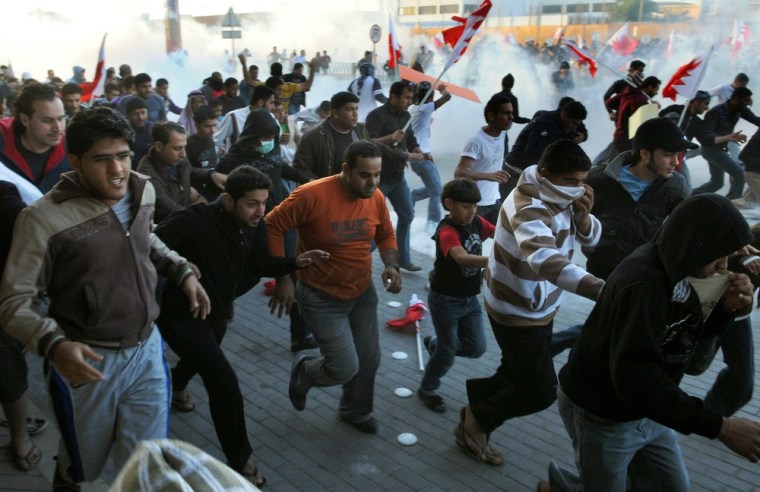Police in Bahrain fired teargas and rubber bullets to break up pro-reform demonstrations on Monday and one protester was killed, witnesses said, in a "Day of Rage" spurred by popular upheaval in Egypt and Tunisia.
Helicopters circled over the Gulf Arab state's capital Manama, where protesters had been due to gather but which remained quiet as security forces patrolled Shi'ite areas. More than 20 people were hurt, one of them critically, in clashes in Shi'ite villages that ring the capital, witnesses said.
Bahrain, where a Sunni Muslim family rules over a Shi'ite majority, offered cash payouts in the run-up to the protest, a move apparently designed to prevent Shi'ite discontent from boiling over as "people power" revolts spread in the Arab world.
Two witnesses at a Manama hospital said a 22-year-old protester from Daih village died from bullet wounds in his back, and another was in critical condition with a fractured skull.
In the village of Diraz, authorities dispersed with teargas about 100 Shi'ite protesters who had squared off with police, demanding more political rights. Another 10 were injured in Nuweidrat by police firing teargas and rubber bullets at protesters calling for the release of Shi'ite detainees.
"There were 2,000 sitting in the street voicing their demands when police started firing," 24-year-old Kamel said.
"We don't want to overthrow the ruling family, we just want to have our say," said Ali Jassem, married to a daughter of Sheikh Issa Qassem, a powerful Shi'ite cleric.
Diplomats say Bahrain's demonstrations, organized on Facebook and Twitter, would gauge whether a larger base of Shi'ites can be drawn to the streets.
"We call on all Bahraini people — men, women, boys and girls — to share in our rallies in a peaceful and civilized way to guarantee a stable and promising future for ourselves and our children," activists said in a statement on Twitter.
"We would like to stress that February 14 is only the beginning. The road may be long and the rallies may continue for days and weeks, but if a people one day chooses life, then destiny will respond."
Analysts say large-scale unrest in Bahrain could embolden marginalized Shi'ites in nearby Saudi Arabia, the world's biggest oil exporter.
There was no immediate comment from Bahraini authorities.
Protest organizers said they sought a new constitution, to be drawn up a committee including both Sunnis and Shi'ites.
They want an elected prime minister, the release of "all political prisoners," and a probe of torture allegations.
Bahrain is a small oil-producer whose Shi'ite population has long complained of discrimination by the ruling Sunni al-Khalifa family, well before uprisings in Tunisia and Egypt emboldened activists throughout the region.
While tension pervaded Shi'ite villages, in Manama government supporters honked car horns and waved Bahraini flags to celebrate the 10th anniversary of a national charter introduced after unrest in the 1990s.
The cost of insuring Bahrain's 5-year sovereign debt widened by 10 basis points on Monday, according to Markit, in a sign investors were worried about stability.
King Hamad bin Isa al-Khalifa, trying to take the steam out of protests, said he would give 1,000 dinars ($2,650) to each local family, and the government has indicated that it may free minors arrested under a security crackdown last year.
Non-OPEC Bahrain, which unlike Gulf Arab peers has little spare cash to use for social problems, has also said it would spend an extra $417 million on social items, including food subsidies, reversing attempts to prepare the public for cuts.
